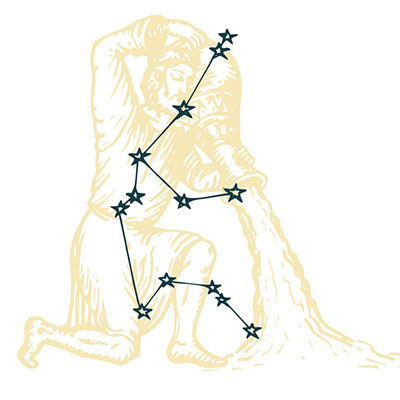












January 21 - February 19
Aquarius' Planet: ♄ Saturn, ♅ Uranus.
The ancient Sumerians considered the Aquarius constellation (Latin name Aquarius) to be one of the most important constellations in the sky. They personified this constellation with the Sumerian sky god Anu. The ancient Greeks saw in Aquarius the wine pourer Ganymede, the hero of the global flood Deucalion, and even the ancient king of Attica, Cecrops.
The "jug" in Aquarius' hands is formed by a small group of five stars in the shape of a Y. From this jug, Aquarius pours life-giving moisture onto the Earth.
In 1998, astronomers discovered 4 huge planets in the star system Gliese 876 in the Aquarius constellation. This was the first case of detecting planets around a red dwarf - such stars are not typically associated with planetary systems.
Another cosmic phenomenon also resides in the unpredictable constellation of Aquarius. This is the star BD−22º5866, which astronomers previously thought was a double star, but has recently been proven to consist not of two, but of four stars - two pairs, which rotate as if in a waltz, around each other. Star systems like this are extremely rare in the Universe.
The brightest star of the Aquarius constellation is a yellow supergiant, such stars are also more of an exception than the rule. This star has its own name, Sadalmelik, which translates from Arabic as "The Lucky Star of the Kingdom".
Astrology of Aquarius
Aquarius Months: January, February
Aquarius is the 11th sign of the Zodiac. The sun enters this sign on January 20 or 21 and stays in it, depending on the year, until February 19 or 20.
Season of Aquarius: Winter
Aquarius is the second winter sign. This is the coldest and most brutal period of winter, but beneath the ground, nature is already preparing to awaken: seeds are taking root. Their drive for independence and self-reliance helps them wait for spring, and these same qualities are embodied in the character of Aquarius.
Element of Aquarius: Air
Air is the most changeable and unpredictable element, and in astrology, it represents contacts, communication, and interaction. The Air element encompasses three Zodiac signs: Gemini, Libra, and Aquarius. As an Air sign, Aquarius feels most comfortable where there is change, movement, and happenings. Therefore, it always strives to be at the center of events, often arriving there even before the event has occurred.
Air endows Aquarius with curiosity, quick adaptation to anything new, and the ability to fantasize and think creatively. Thanks to the mobile Air, Aquarius can splendidly adapt to different situations, loves adventures, and embraces change.
Ruling Planets of Aquarius: Saturn, Uranus
At Saturn's behest, everything in our lives that falls under the category of "Must" occurs: discipline, organization, obligations, work. Saturn also rules theory and science, power and order, traditions and accumulated human experience. Thanks to Saturn, Aquarius taps into the wisdom accumulated over centuries by generations. This allows Aquarius to deeply comprehend the essence of any phenomena and events, and also effortlessly peer into people's souls.
Uranus is the planet of independence and beginnings, calling us to look at familiar things from a new angle, expanding consciousness and worldview. Uranus's influence makes Aquarius eccentric and vibrant, freedom-loving, prone to occultism and creativity, open to everything new, be it new people or new ideas.
Color of Aquarius: Raspberry, as well as all shades of gray and silver.
Metal of Aquarius: Lead.
Talisman Stone of Aquarius: Sapphire, black pearl.
Opposite and Complementary Sign of Aquarius in the Zodiac Circle: Leo.
Geographical Places Most Resonating with Aquarius
Countries, places, and cities with kindred energies, where Aquarius might feel particularly at ease.
Countries: Australia, Chile, Cyprus, Gambia, Sweden, Vatican, Venezuela.
Regions: Abyssinia, Mongolia, Piedmont, Prussia.
Cities around the world: Bremen, Hamburg, Salzburg.
More Aquarius horoscopes:

Choose a Zodiac sign













 Fortune Cookies
Fortune Cookies



















































































































